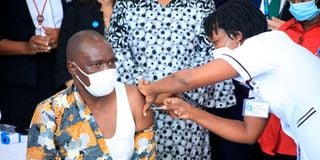Premium
Hope at last as vaccines taken to the counties

Kenyatta National Hospital (KNH) nurse Lucy Kipkemei vaccinates Dr Patrick Amoth, the acting Health Services Director-General, following the launch of the drive on March 5, 2021.
What you need to know:
- Health Principal Secretary Susan Mochache echoed his sentiments and disclosed that the nationwide vaccination would start at county referral hospitals immediately.
KNH Chief Executive Evanson Kamuri was the second person in Kenya to receive the coronavirus vaccine.
At half past noon yesterday, the first Covid-19 vaccine recipient in Kenyan soil up-rolled his sleeves for the much-awaited shot at Kenyatta National Hospital (KNH).
Health Acting Director-General Patrick Amoth was the first Kenyan to be given the Covid-19 shot.
During the launch of the rollout, Dr Amoth said the government targets to vaccinate 1.25 million Kenyans against the virus by June.
“We are vaccination is in phases. Phase One starts now until June 30 and it targets 1.25 million people. The second phase will begin thereafter and will target about 9.6 million Kenyans,” he said.
The Health Director-General assured the country of the safety of the vaccine, insisting that the product had undergone a rigorous approval process.
“We are launching one of the most important vaccines in combating Covid-19,” he said.
Health Principal Secretary Susan Mochache echoed his sentiments and disclosed that the nationwide vaccination would start at county referral hospitals immediately.
“It is our responsibility to ensure the health care workers get support when combating this virus. This may mark the beginning of the end of the pandemic” Ms Mochache told journalists and those at the launch.
World health organisation (WHO) Country Representative Rudi Eggers urged everyone to keep observing Covid-19 protocols like social distancing, washing of hands and wearing masks despite the vaccination campaign.
Full recovery
“With the arrival of the vaccine, we are on the road to full recovery from the pandemic,” Dr Eggers said.
Ms Lucy Kipkemei, the first nurse to administer the Covid-19 shot in the country, told the Satuday Nation that she hopes the vaccine will boost the country’s war on the virus.
“I am happy to have achieved my objective for the day. We are doing this for the good of Kenyans,” Ms Kipkemei said.
KNH Chief Executive Evanson Kamuri was the second person in Kenya to receive the coronavirus vaccine.

In an interview with the Saturday Nation, Dr Kamuri said he felt great and was looking forward to more people getting vaccinated against the deadly disease.
“Everything went well. I was not nervous,” the KNH chief executive said.
The third to be inoculated was Ms Jemimah Katama, an infection, prevention and control officer at the referral hospital.
The 50-year-old became the first Kenyan health worker to get the Covid-19 shot.
“It was not painful. I took it for my protection and urge Kenyans to do the same,” Ms Katama told the Saturday Nation.
Dr Kennedy Momanyi and Dr Juliana Muiva, both of KNH went up next, both elated at the reality that they had received the much-talked about vaccine.
Ms Pauline Achieng, 26, and a security guard at the hospital received her shot too.
“I feel good. We are the ones who receive patients and visitors. This is an important and special moment,” she said.
Amref chief executive Gitahi Githinji reminded said t is not the first time Kenya is administering vaccines to its citizens.
“The government has committed to leaving no Kenyan behind. Our new digital immunisation platform (Chanjo) will ensure effective data collection and management of whoever receives the vaccine,” Dr Githinji said.
The recipient is first expected to give a consent then submit personal details, which are captured in an online register.
The digital platform “Chanjo” was developed by the ICT Ministry.
The nurse then explains what the vaccine is about and potential side effects.
The recipient is then informed of the second dose.
In less than a minute, the nurse pinches left arm of the recipient and administers the vaccine.
A text from the Chanjo system follows in 10 minutes after the administration, notifying the recipient that he or she has been vaccinated against Covid-19.
“Congratulations (your name) on receiving your first dose of the Covishield vaccine batch no. X. Chanjo, powered by MoH,” the text reads.
30 minutes
The individual is monitored for about 30 minutes after, he or she is allowed to leave.
They are expected to return for the second dose after eight weeks.
As at 2.20pm, some 120 people had been registered on Chanjo.
The Health ministry has been training a team of 400 health care workers drawn from all counties to administer the vaccine.
The exercise ended on Thursday with a dry run at KNH.
Kenya Coronavirus Vaccine Task Force chairman Willis Akhwale said the timing is strategic.
“We did not want them to train early and wait for long. We want them to start with the vaccine rollout when they are still fresh from class,” he said.
As per WHO guidelines, the route to administration of a vaccine is the path by which the drug is brought into contact with the body.
This is a critical factor for the success of the immunisation.
“A substance must be transported from the site of entry to the part of the body where its action is desired to take place using the body’s transport mechanism for this purpose,” the official WHO website states.
Immunologists say there are three most common types of injection during inoculation. The first is intramuscular (IM) injection, the second being the subcutaneous injection while intradermal is the third.






